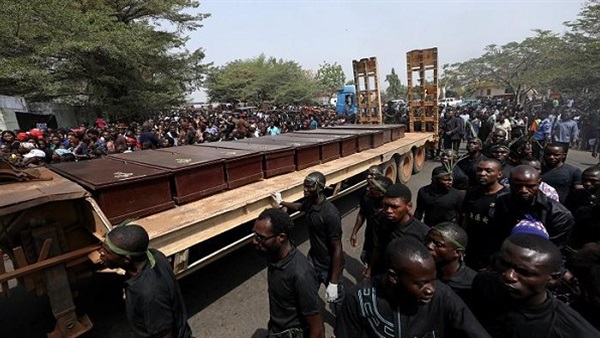Is religious radicalism a mere sectarian dispute in Nigeria?

Since the downfall of
the Islamic Sunni Caliphate of Sokoto in West Africa in 1902, leaders of many
Islamic groups in Nigeria raised slogans of reinstating the Islamic ruling.
However, other religious followers and ethnic groups hindering those Islamists’
dream to come true.

Nigeria has witnesses waves of violence resulted in presence of three radical movements: The Islamic Sunni Boko Haram militant group, Christian radical group, and the Islamic Shiite radical Movement.
This study sheds the light on the negative implications of the three radical groups for Nigeria’s political system and entire West African region.
Since Nigeria has gotten its independence from British colonization in 1960, the country witnessed religious polarization among the Christians and Muslims.
Due to the absence of a clear census in Nigeria, Christians leaders try to raise the Christian population and reduce the proportion of Muslims and vice versa for the Muslims.
According to a census conducted in 1963, the Muslims in the Nigerian society formed about 47%, comparing to 35.5% of the Christians, while the followers of other religions exceeded 18.3%.
Nigeria has about 250 different ethnic groups, according to the 1963 census. Despite the ethnic diversity, many researchers divide the ethnic groups into three main groups as follows:[6]
1- The Hausa-Fulani community: It constitutes 29.5% of the total population. Most of the community are Muslims and live in northern regions of Nigeria. [7]
2- The Yoruba group: They live in the southwestern regions of Nigeria and embrace Islam and Christianity. It forms 20.3% of population.
3- The Igbo group: This Christian community lives in the southeastern of Nigeria, and they account for 16.6% of the total population.

Muslims in the ethnic groups also suffer division between shiite and Sunni. Similarly, Christians in Nigeria suffer from doctrinal discrimination between Catholic churches, Protestants and local churches (aka the Aladura churches).
The religious differences between the Muslim in the North of Nigeria and the Christian in the south were shown when the northern states applied the Shariaa (Islamic law), while the south, controlled by Christians and paganists, rejected the application of Muslims’ law. [12]
Also, recognition of Israel is an essential difference between Muslims and Christians in Nigeria. While Muslims were keen not to recognize Israel, Christians had close ties with Israel. [13]
As a result, a bloody coup d'état took place on January 15, 1966 under the leadership of former President Johnson Aguiyi-Ironsi. So Christian military officers controlled over the northern part, which saw violent unrest. However, another bloody coup occurred in July of the same year during which Aguiyi-Ironsi was kidnapped and killed. [14]
Therefore, the religious violence resulted in three
Sectarian war has been alarmed due to the religious violence. For example, Sunni Salafist preacher Abu Bakr al-Gumi warned of Christian-ruling in the north in 1987 and the Muslims did not allow any Christian presidential candidate to win in the the North. In return, the Bishops of Lagos threatened that that the Christians could burn the whole state as it is a religious war that no one will stop. [16]
In 2000s, the escalating religious violence was embodied in Boko Haram group, resulting in emergence of many radical Christian organizations, which call for protection of Christians from the attacks of Boko Haram.

1- Sunni radical group:
Salafism, in its current form, has been applied in Nigerian society for more than 200 years by Islamic promoter and preacher Usman dan Fodio.
Fodio declared the Islamic Jihad in the Hausa and imposed the Arabic language as an official language in those areas to establish the Islamic Caliphate. Fodio’s Islamic approach was as a way to revive the Caliphate of Sokoto.
The Sunni radical movements include Ansar al-Din group, Jama'a Nusrat ul-Islam wa al-Muslimin' (JNIM), the Muslim Students Society of Nigeria (MSSN), the Group of Rejecting Defamation and the Establishment of the Sunnah, the Muslim Coexistence Group, and the Nigerian Supreme Council for Islamic Affairs (NSCIA),and Boko Harm.
2-Shiite radicalism:
Iran has relied on the Lebanese community in West Africa to spread Shiism, and exploited the spread of Sufi orders (mystical schools) such as Tijaniyah and Qadriya in order to penetrate the Nigerian society. The Shitte Muslims form about 8 million Nigerians. The Shiite radical groups include ShuhadaFoundation, AL-Zahra Foundation, which was founded in 2010. Al-Zahra works on providing all social and civil services to the Nigerian community such as drilling wells and giving charities to the poor.
Over the past four years, sectarian clashes escalated in Nigeria. In November 2015, a celebration of Ashura commemoration was targeted by an explosive belt, killing 22 people. In December 2015, clashes broke out between the foundation supporters and the Nigerian army on charges of plotting an assassination attempt against the chief of staff.
Christian radicalism
The Nigerian Christian community has witnessed a major fundamentalist change has begun since the 1970s. Some Christians groups like "The Born Again Movement" has recently adopted the radicalism after targeting Christians by Boko Haram militants.
In conclusion, radical Christianity emerged as a result of Islamic radicalism, and vice versa. Both sides reject the coexistence.







